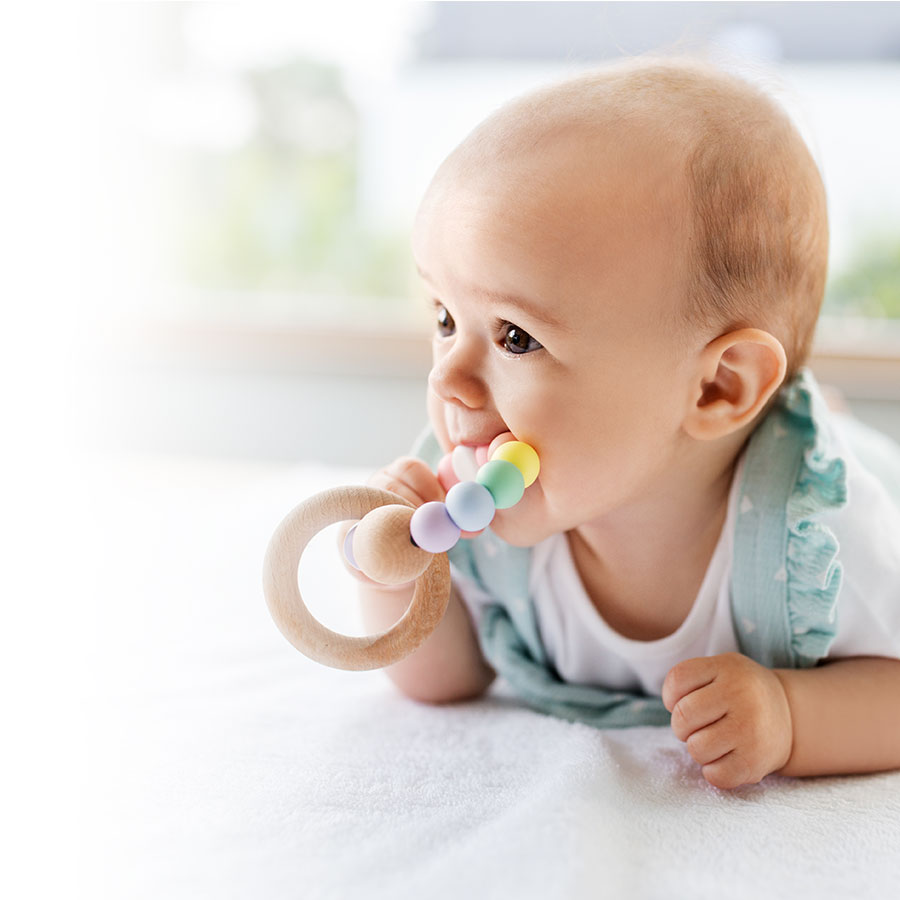Teething is an important step in your baby's life and in yours. Unfortunately, it can be accompanied with some discomfort. Learn more about how to relieve the symptoms associated with teething to improve your baby's well-being.
Teething
Teething generally occurs around the age of six months. However, it can occur earlier, around age three months, or later, at age one year. Usually, all 20 primary teeth will have grown in when your child reaches age three.
Although many children have no teething symptoms at all, others experience some discomfort or, in rare cases, pain. The following are among some of the typical symptoms associated with teething:
- swelling or redness of the gums
- increased salivation
- irritability or more frequent crying
- tendency to bite or chew objects
- redness on the cheeks or chin
- diminished appetite
- loose stool
- a slight rise in temperature
- poorer sleep
Symptoms associated with teething generally begin a few days prior to the tooth piercing the gum. They diminish once the tooth has pierced the gum.
How to provide your child with relief
Although the symptoms associated with teething are not alarming, they can be unpleasant for your child. Here are a few tips to provide your child with relief:
- Give your child a clean wash cloth to chew on that has been soaked in cold water.
- Gently rub your baby's gums with your finger. Remember to wash your hands well before doing this.
- Use a soft bristled toothbrush to gently massage your baby's gums.
- Cuddle your child. Babies need to be held, given affection, and hugged. Being reassured will help ease their symptoms.
- Give your baby a rubber teething ring to bite on. Choose a ring that is large so your little one cannot fit it completely inside their mouth. Avoid rings that contain a liquid or that might break. For extra relief, place the ring in the refrigerator before use (do not place it in the freezer to prevent cold burns).
If you are looking for the ideal product to help your child during the teething period, ask the advice of your pharmacist, who can help you choose a durable and safe teething ring for your baby.
Tricks to avoid
Even if you wish to do everything possible to bring your baby relief, it is important to know that some tricks must be avoided to protect your child's health:
- Avoid the use of teething biscuits. The sugar contained in these biscuits can promote tooth decay.
- Avoid giving your child pieces of fruit or raw vegetables to bite on (carrots, apples, etc.). This technique is a choking hazard and should never be used for children under age two.
- Avoid the use of hazelwood necklaces. Not only has their effectiveness not been proven, but they are also a choking hazard.
The role of medication
If the above-mentioned measures have failed to relieve your child, it is possible to use certain over-the-counter medications. Acetaminophen and ibuprofen are medications that treat pain and fever associated with teething. Speak to your pharmacist if you want to give these medications to your child. Pharmacists can advise you about what product to choose and calculate the appropriate dose to give according to your child's weight.
In any case, never give your baby aspirin (acetylsalicylic acid), as its use is contraindicated before 18 years of age.
Gels intended to relieve pain by local application to the gums are not recommended. They can be swallowed by your baby and cause significant side effects. Additionally, these products can diminish sensitivity of the throat, thus hampering deglutition (the action of swallowing), which increases the risk of choking. Therefore, it should be avoided.
When to consult a doctor
It usually isn't necessary to see a doctor when your baby is teething. Teething symptoms are often mild and will dissipate after the teeth have pierced the skin. However, if your child has a high fever (above 39°C) or if it persists, you should see a doctor. This is also true if your child presents other symptoms such as vomiting or persistent diarrhea.
It is often difficult to pinpoint the source of a baby's pain. Babies cry, make gestures, can’t sleep—what is it exactly? Parents are sometimes completely baffled. When they are unable to identify the cause of the issue affecting their child, some of them may have a tendency to conclude that it is due to teething. While some parents are able to figure it out, others remain in the dark.
When your child has an unexplained ailment, it is sometimes preferable to see a doctor. Ask your pharmacist for advice if you are unsure if a doctor's visit is necessary.
For additional information about teething, don’t hesitate to speak to your pharmacist, who can provide some insight.

